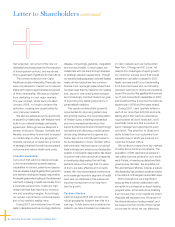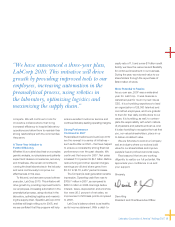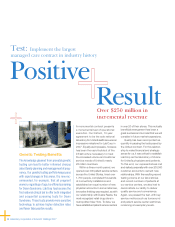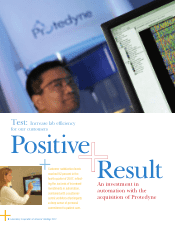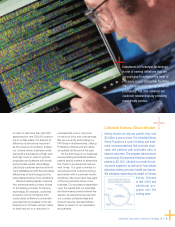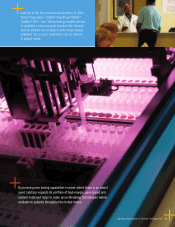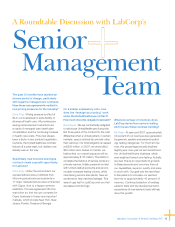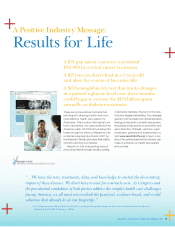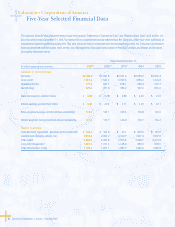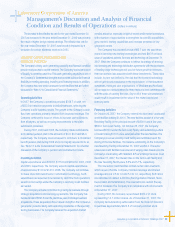LabCorp 2007 Annual Report Download - page 16
Download and view the complete annual report
Please find page 16 of the 2007 LabCorp annual report below. You can navigate through the pages in the report by either clicking on the pages listed below, or by using the keyword search tool below to find specific information within the annual report.
14 Laboratory Corporation of America® Holdings 2007
Please share an example of a test
that demonstrates the concept of
personalized medicine?
Myla Lai-Goldman: We are collaborating
with ARCA Discovery, a biopharmaceutical
company, to develop a commercial genetic
test to aid in prescribing bucindolol, a
generically targeted heart failure drug that
ARCA is developing. Our test will identify
common genetic variations that regulate
the heart and that affect a patient’s
response to bucindolol. The development of
a commercial genetic test in parallel with the
drug approval process is an innovative
new model for the drug development
industry and one that we look to replicate
with other partners.
How are you working with your
managed care partners to help them
better manage health care costs for
their patient populations?
Scott Walton: We believe that LabCorp
is the only national lab that has standard-
ized data on the patients we see. Our goal
over the next few years is to bundle this
data into useful reports for both managed
care companies and physicians so that
they can better care for their patients.
As you develop or license new esoteric
tests, what are your criteria? How do
you decide which tests to pursue?
Myla Lai-Goldman: Market needs really
drive our decision-making process. We look
for technologies that can truly deliver new
insights to health care providers. In our
evaluation process, we ask a key question –
“Are there any other tests on the market
today that can reveal the same result?”
If not, then we have uncovered an unmet
need. We also look at our ability to com-
mercialize the test on a broad basis
and evaluate the likelihood of acceptance
and adoption rates among providers. Some
recent examples include our agreement with
Duke University to develop a lung cancer
screening test and with Intema Limited‘s
Integrated and Sequential screening tests
for Down Syndrome.
Shifting to operational issues, can you
provide some specifi c examples of the
type of process improvement tools that
you will be implementing as part of the
LabCorp 2010 initiative?
Don Hardison: LabCorp 2010 is a vision
whereby we are not only the most auto-
mated and efficient lab, but also the easiest
lab for both patients and physicians to work
with. We have plans to automate check-in
processes at our Patient Service Centers
by using a kiosk, similar to those used by
airlines. At the lab, we plan to automate
many of our preanalytical areas, such as
splitting and order entry. Years ago, LabCorp
had the foresight to standardize its lab and
billing systems. Now we are taking efficiency
to the next level.
Beyond acquisitions, what other uses
do you anticipate for cash during 2008?
Brad Hayes: Cash investments are guided
by our commitment to return value to our
shareholders. We should look to grow
our business, either organically or by
acquisitions and licensing agreements.
At the same time, we recognize that
share repurchases play a big part in how
we return value to our shareholders. We
plan to be opportunistic on both fronts.
How attractive is the acquisition market?
Dave King: The acquisition market is still
as attractive as ever. During the first half of
2007, pricing was a bit higher than normal,
due to readily available credit. As the credit
markets tightened in the second half of the
year, we saw pricing return to a range more
in line with historical levels. We are sensitive
to price and need to ensure that acquired
growth is accretive and strategic. This means
acquisitions must either help increase our
presence in key geographic areas or grow
our esoteric testing franchise. The purchase
of Tandem Labs to further our initiatives in
personalized medicine is a good example
of the type of transaction that interests us.
What effect would a prolonged
economic downturn have on
your business?
Brad Smith: We are uncertain of the effect
on volume in a prolonged downturn. During
the last downturn, we did not notice any
significant effects on volume, but health plan
benefit designs have changed significantly
in recent years. We monitor volume daily
and are attuned to any emerging issues.
Cash collection is another area that we will
watch. We see an increasing number of
“high deductible” plans in which the patient
is responsible for more payments prior
to insurance covering the cost of care.
Although we have been successful with
collecting in the past, a recession could
present obvious challenges.
A Roundtable Discussion with LabCorp’s
Senior Management Team continued


